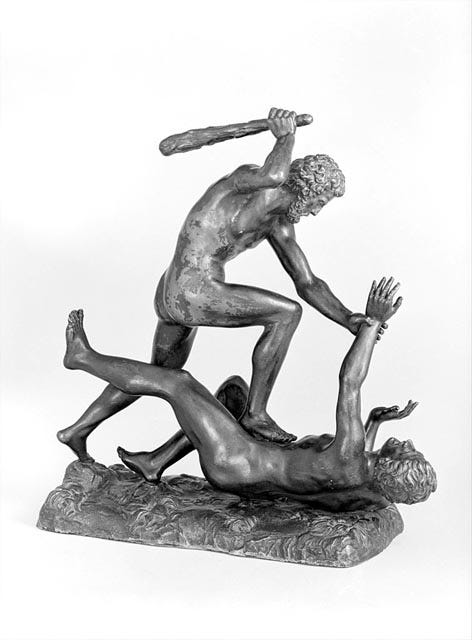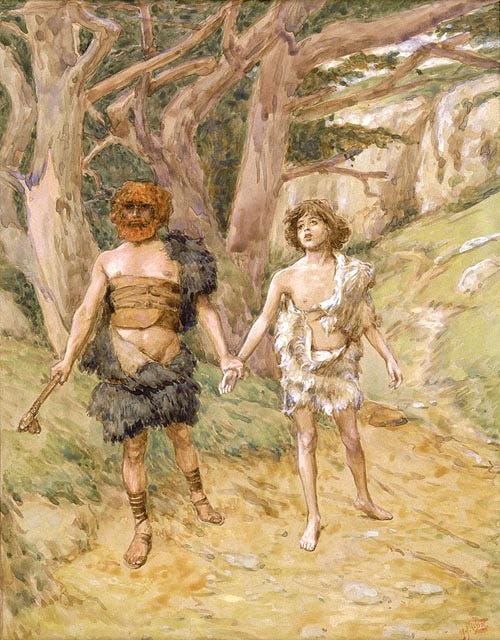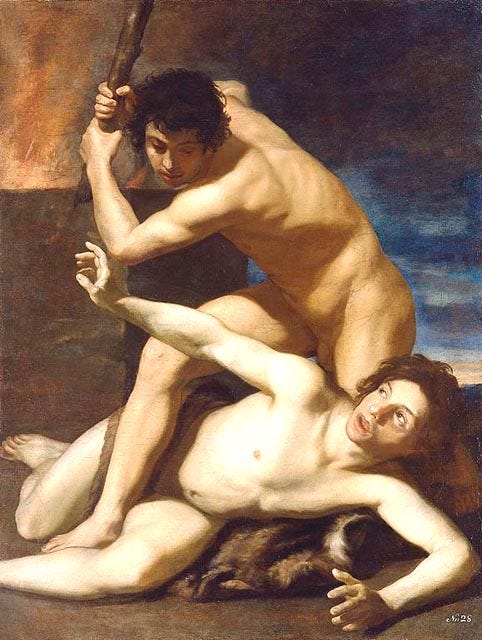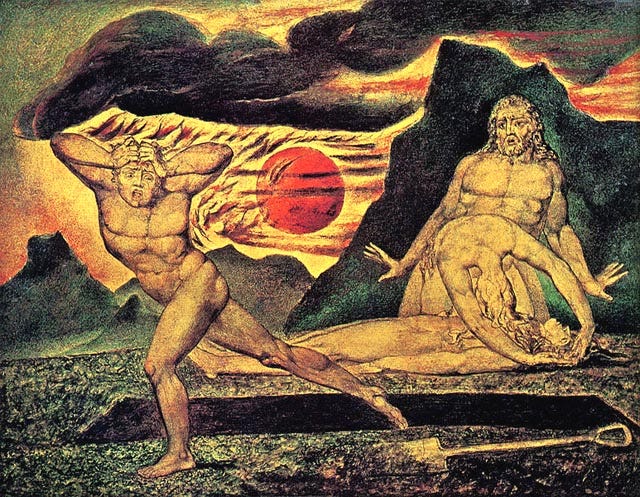You'll be relieved to know that as we move further from Eden, the Lessons will get shorter. There was lots to unpack in those primordial moments; now we're starting to live in the mundane.
This week's story starts and ends with birth, and has a death in the middle--in fact, the first human death we know of, and it was a murder most foul! As one of my all-time favorite Bible teachers, Dr. J. Vernon McGee (whose radio program I listened to for years, and which I have now found online) put it: in Genesis 3, when Adam and Eve ate the from the Tree of the Knowledge of Good and Evil, we see the "root of sin"; here in Chapter 4, we see the "fruit of sin."
The Story
(See the full text below.)

A 17th century "Netherlandish" sculpture believed to be Cain and Abel, by an unknown artist. (Wikipedia)
So here's what happened: After their eviction, Adam and Eve became the first parents by giving birth to their first sons (and presumably at this point Eve learned what the god meant when he said, "in sorrow you shall bring forth children"). Cain was the firstborn (making A & E the first to "raise Cain," which, as we shall see, is not that funny), and Abel was his little brother. The elder brother became a farmer, and the younger a shepherd. (Incidentally, it has been suggested that they were twins. I don't think so.)
Somewhere in the very earliest days, the god seems to have set up a system of sacrifice; it was many book later that the prophet Samuel said, "Has the LORD as great delight in burnt offerings and sacrifices, As in obeying the voice of the LORD? Behold, to obey is better than sacrifice, And to heed than the fat of rams."

The Sacrifice of Cain and Abel by Giorgio Vasari, 1554/55. (Wikipedia) (Note simultaneous murder on right)
Anyway, the two brothers brought their offerings to the god (what did he do with them?). The elder brought produce, "the fruit of the ground," and the younger brought meat, "the firstlings of his flock and of the fat thereof."
Now for some reason that the text leaves unclear, the god "had respect" for Abel's offering, but not for Cain's. Big brother did not take this well. The god asked him why he was upset (really?) and said in a very confusing "explanation" that Cain has to "do the right thing"--without explaining what that is. Then the god says that sin is always ready to pounce, but Cain has to master it.

Cain leadeth Abel to death, by James Tissot, c. 1900. (Wikipedia)
Which he doesn't, because soon enough, the brothers are out in the field, and Cain kills Abel--we don't know how.
So the god shows up and plays naive, like in the Garden scene in last Lesson. "Hey, Cain, where's your brother?" (like he didn't know). And Cain says, "How should I know?" and then asks the snarky rhetorical question that has rung down through the ages: "Am I my brother's keeper?"
So the god says, "What have you done?" (as if he didn't know). And then things get creepy. He says: "The voice of your brother's blood cries to me from the ground." Next comes a pretty typical curse (the soil won't yield yada yada yada) a-a-a-a-nd you're banished, to wander the earth.

Cain killing Abel by Bartolomeo Manfredi, c. 1600. (Wikipedia)
Cain whines that this is "too much" (for fratricide? Really?) and worries that people will kill him (which would make his the first capital case). So the god gives him the proverbial "mark of Cain," which no one can describe today, and off Cain went.
But Cain doesn't wander. He almost immediately built a city "in the land of Nod" and named it after Enoch, his first son by his unnamed wife. Then we get a little genealogy, from Enoch to Lamech.

The Body of Abel Found by Adam and Eve by William Blake, 1826. (Wikipedia)
Lamech, who would be Adam and Eve's great-great-great-great-grandson, had two wives, Ada and Zillah (making him the first man to marry women fro A to Z!), and their kids were also responsible for a bunch of "firsts": Adah's boy Jabal was the first tent-dwelling nomad, and Jubal the first musician; Zillah's son Tubal-cain taught metal work. Tubal-cain also had a sister named Naamah, who doesn't seem to have been the first at anything, except maybe at being named Naamah.
It seems at some point Lamech was attacked--whether by one assailant or two is unclear, but let's go with one--and killed the guy. He points out that the god had said if anyone killed Cain for slaying Abel, Cain would be avenged "by seven times as much." (I'm not sure how that would work.) So, since Abel's murder was unjustified--he was innocent--and the guy Lamech killed had attacked him first, Lamech declares that anyone who tried to kill him for murder would by avenged 77 times.
The chapter ends with Adam and Eve, perhaps after a suitable period of mourning, giving birth to a third son, Seth, whom Eve herself sees as a replacement for Abel. And Seth has a son named Enos, after whom--despite the offerings that kicked off this who saga--"men began to call upon the name of the LORD." (Though some explain this with an alternate reading--"Then men began to call themselves by the LORD's name," e.g. "we are his people," I still wonder how this came about so late in the game.)
The Rejected Child
In a criminal investigation, as you would know if you had watched as many hours of Law & Order as I have, the authorities need to determine that a suspect had three things: motive, means, and opportunity. In slaying Abel, Cain clearly had the opportunity: they were in the field together, and it's doubtful that anyone (besides the god) was watching. As for means, we don't know what Cain used as a murder weapon, but in art, it's usually a club or some kind of stick. As we saw, before Tubal-cain there was no metal work, so it probably wasn't a knife. But a rock would do.
Motive, however, is harder to pin down. I'd like to suggest one.
Everyone knows Frankenstein's monster. (By the way, that's the big scary guy; the name "Frankenstein" alone refers to the doctor who created him.) What some fail to realize is that, despite his huge stature and hideous ugliness, the creature was sensitive--even downright emo. He did not become a "monster" until people--including his own "father"--reacted to him in shrieking fear.
Which brings us back to Cain. We see him angry--the King James Version (KJV) says "wroth"--when the god rejects his gift. It is this anger, based in rejection, that caused him to do it.
But this just raises (not begs!) another question: why did the god reject Cain's sacrifice?
This is a tough one. Hundreds of years later, maybe a millennium or more, the New Testament writers claim that Abel's sacrifice was made "by faith," implying that Cain's was not. I see nothing in the Genesis account that spells this out; it seems to be an assumption based in the very rejection itself. "He must not have offered his sacrifice with a pure heart, because the god rejected it." Circular logic: He rejected it because Cain lacked faith, which we know because he rejected it. (Dizzying.)
Some see in this a back-reading from the later rules: that a sacrifice without blood, which Cain as a "tiller of the soil" could not have produced, cannot justify the one who offers it.
But not only was the system of blood sacrifice not in place; some commentators claim that, this being before the Ten Commandments, murder was not even yet a sin! (Nonsense: do they mean to say that no one who killed another human, or slept with another's spouse, or stole something, from Eden until Moses on Mount Sinai, was guilty of a sin? Not buying it!)
May I suggest that the god liked a nice, fatty bit of mutton better than a bowl of cereal? Irreverent though it may be, that really seems to be the case.
The words the god says afterward--about "doing well" and "controlling" impulses to sin--may go some ways to explaining what Cain did wrong, but it's a shame the writer didn't practice the Five Ws and an H.
The Mark of Cain
Some claim that the "mark of Cain" was literally a mark, like a facial tattoo or something. Others that it was a horn growing out of his forehead, or a physical affliction, like epilepsy. In one rather random suggestion, a 3rd-century rabbi said that God gave Cain a dog, by which he would be known.
Some ancient sects of Christianity suggested Cain's face was blackened through violence, like being pounded with hail, though not in a racial sense. But leave it to American Protestant preachers to claim that the skin of Africans bore the mark--and thus slavery was justified as a punishment for Cain's sin (never mind that we're all descended from Noah, right?).
The Church of Jesus Christ of Latter-day Saints took up this idea of blacks as associated with Cain (or, similarly, with Noah's son Ham, whose wife was descended from Cain, they claim) and excluded them from the Mormon priesthood until 1978. No less august a personage than Brigham Young, second president of The Church, stated the case in no uncertain terms: the curse of Cain required slavery, he said, and blacks should not have the right to vote. Anyone who made "the children of Cain" equal to whites, or married one, would be subject to the same curse as Cain. The church, of course, has repudiated these ideas since Brigham.
Anyway, let's remember that although there was indeed a curse, which was a bad thing, the mark was a gift, a sign to others to lay off of Cain because he was under the god's protection. Which is more of a problem than the nature of the mark, because why was the god being so lenient at this point?
--------
Everything else I want to say can be crammed into Footnotes.
The Text: The Birth of Cain and Abel

Adam and Eve with Cain and Abel by Louise Hollandine van de Pfalz, 1660. (Wikipedia)
4:1 And Adam had sex with Eve his wife; and she conceived, and gave birth to Cain, and said, "I have gotten a man from the LORD."
4:2 And she again gave birth, to his brother Abel. And Abel was a keeper of sheep, but Cain was a tiller of the ground.
4:1 had sex with: the King James Version says Adam "knew" Eve, which gives rise to the ribald jest, "Yes, I know Suzie--but not biblically." <yuk yuk> As near as I can figure, the verb alludes to the most intimate type of familiarity.
4:1 "I have gotten a man from the LORD": As with other names, this one derives from an uncertain etymology in which "Cain" means "to get." (But some say it means "smith," as in "metal-worker"; see Tubal-cain in 4:22 below.) A later tradition--attempting to account for Cain's depravity--claims that Cain was "begat" on Eve by Satan, so here, as Gertrude did in Hamlet, they claim "The lady [Eve] doth protest too much, methinks."
4:2 Abel: the name may mean "breath" or "vapor," but some scholars (perhaps noting that Eve doesn't bother with providing a sketchy pun on the name, as she does with Cain and Seth) claim the name is essentially meaningless.
4:2 Abel was a keeper of sheep, but Cain was a tiller of the ground: The conflict between pastoralists and farmers raises its ugly head, as it did well into the American West of the 19th century.
The Text: The First Sacrifice
4:3 And in process of time it happened, that Cain brought the fruit of the ground as an offering to the LORD.
4:4 And Abel also brought of the fatty portions of the first lambs born in his flock. And the LORD respected Abel and his offering:
4:5 But he did not respect Cain and his offering. And Cain was furious, and his face fell.
4:6 And the LORD said to Cain, "Why are you so angry? and why has your face fallen?
4:7 "If you do well, won't you be accepted? and if you do not do well, sin lies at the door. And it shall desire you, but you must master it."
4:3 an offering: Part of this story's obscurity stems from our lack of knowledge of what the rules of "offering" would have been at the time the story was written.
4:4 the LORD respected: We also don't know what "respect" means here. The New Testament (specifically Acts 10:34) tells us, "God is no respecter of persons," meaning he is impartial. Clearly, not here! Again, this may have something to do with the state of Cain's heart as he makes his offering. No one knows.
4:5 Cain was furious, and his face fell: Old King Jim says he was "very wroth, and his countenance fell." One dictionary says that for one's face to fall means one is "disappointed or disheartened, especially after being very hopeful or optimistic before." So, like, "Daddy, look what I brought you" is met with, "That's a bunch of crap, boy." Yeah, the rejected child.
4:6 "Why are you so angry?...": Here's that dim-seeming god again. He didn't know? Or is this just clumsy dialogue?
4:7 The KJV translates this verse as obscurely as possible: "If thou doest well, shalt thou not be accepted? and if thou doest not well, sin lieth at the door. And unto thee shall be his desire, and thou shalt rule over him." I cleaned it up as best I could.
The Text: The First Murder and its Fallout
4:8 And Cain talked with Abel his brother: and it happened, when they were in the field, that Cain rose up against Abel his brother, and killed him.
4:9 And the LORD said to Cain, "Where is your brother Abel?" And he said, "I don't know. Am I my brother's keeper?"
4:10 And he [the LORD] said, "What have you done? The voice of your brother's blood cries to me from the ground.
4:11 "And now you are cursed from the earth, which has opened her mouth to receive your brother's blood from your hand;
4:12 "When you till the ground, from now on it shall not yield to you her strength; you shall be a fugitive and a vagabond on the earth."
4:13 And Cain said to the LORD, "My punishment is greater than I can bear.
4:14 "Behold, today you have driven me out from the face of the earth, and I shall be hidden from your face. I shall be a fugitive and a vagabond in the earth, and anyone that finds me will kill me."
4:15 And the LORD said to him, "Therefore anyone kills Cain will suffer vengeance sevenfold." And the LORD set a mark upon Cain, in case anyone finding him should [try to] kill him.
4:8 And Cain talked with Abel his brother: About what, one wonders?
4:9 "Am I my brother's keeper?": The only ethical answer that compassionate people with a conscience could possibly give to this question is an unequivocal "YES!"
4:10 "The voice of your brother's blood cries to me from the ground": Granted, the speaker has the perception of a god and all, but still: What an image!
4:12 "it shall not yield to you her strength": Ignore the pronoun problem here. What's really disturbing is the idea of the soil losing its fertility because of a man's action.
4:12 "a fugitive and a vagabond": That would make for a cool song title, but probably a sucky way of life.
4:13 "My punishment is greater than I can bear": Like a kid stomping his feet and saying, "That's not fair!" And yet he bore it. I find this a touching detail, almost evoking pity for the guy who killed his brother to show daddy what a man he really was.
4:14 "I shall be hidden from your face": So much for omnipresence and omniscience (though admittedly this is the whiny boy talking, not the god).
4:14 "anyone that finds me": As Butch and Sundance repeatedly ask each other, "Who are those guys?" Aren't there only four people in the world? But see the Footnote at 4:17.
4:15 a mark upon Cain: And no one knows what it is, though some pretty disturbing suggestions have been made. See the section about this up above.
The Text: The First Civilization
4:16 And Cain went out from the presence of the LORD, and dwelt in the land of Nod, on the east of Eden.
4:17 And Cain had sex with his wife; and she conceived, and bore Enoch: and he built a city, and called it Enoch, after his son.
4:18 And Irad was born to Enoch; and Irad fathered Mehujael; and Mehujael fathered Methusael; and Methusael fathered Lamech.
4:19 And Lamech married two wives: one was named Adah, and the other Zillah.
4:20 And Adah bore Jabal; he was the father of nomads who dwell in tents and keep cattle.
4:21 And his brother's name was Jubal; he was the father of all musicians who play the harp and organ.
4:22 And Zillah bore Tubal-cain, who taught every artisan working in brass and iron; and Tubal-cain's sister was named Naamah.
4:16 the land of Nod: The word is the Hebrew root of the verb "to wander," but no one knows where this is. Dr. McGee cracked a good one, though, about how he's seen many a congregant go to "the land of Nod" during a long sermon!
4:17 And Cain had sex with his wife: Uh-oh! MASSIVE contradiction: where did he find a wife? If Eve is the mother of all living, was this Cain's sister? Was this permissible, as incest was not yet prohibited? Some True Believers claim that at this point incest is okay, as harmful mutations had not yet crept into "the blood," obviating the need for any such prohibitions. In the next chapter, we're told that Adam had other sons and daughters--tradition (not the Bible) suggest 33 boys and 27 girls. (Wait: mutations? But there's no evolution, right? Again, UH-OH!)
4:17 Cain ... built a city: Thus Cain is the first failed farmer to take up city life. In the first city.
4:18 And Irad was born to Enoch...: Soon we'll be up to our hips in genealogies. We will usually fly right over them, as we do here.
4:19 And Lamech married two wives: Lamech was the first polygamist; some preachers like to point out that this was never specifically approved by the god, though the institution sure hung on for a long time, and was practiced by some of the god's faves: Abraham, Jacob, Moses, David, Solomon--maybe you've heard of them?
4:20-22 Jabal... Jubal... Tubal-cain...: There follows a list of "fathers of" various occupations. This is meant to be the first civilization--and it came from Cain. Perhaps this accounts for the god's displeasure with the humans a few generations later, when he sent the Flood. Seemingly Noah and his sons held onto some of this technology afterward.
4:22 Naamah: One wonders why this lone daughter was mentioned.
The Text: Lamech Commits Murder
4:23 Lamech said to his wives, Adah and Zillah, "Hear my voice,; my wives, and listen to what I say: I have slain a man who wounded me, and a young man who hurt me.
4:24 "If Cain shall be avenged sevenfold, truly I should be avenged seventy-sevenfold.
4:23 I have slain a man: Another confusing episode from the annals of history. Were there two assailants--a man and a young man? Or is this a sort of poetic repetition? And does Lamech really make a convincing case for justifiable homicide, or is he engaging in wishful thinking?
The Text: Birth of Seth
4:25 And Adam had sex with his wife again; and she bore a son, and named him Seth: "For God," said she, "has supplied me with another son to replace Abel, whom Cain slew."
4:26 And Seth also had a son; and called him Enos; then men began to call upon the name of the LORD.
4:25 Seth: "For God... has supplied me with another son to replace Abel": The name can mean "appointed" or by extension "compensation," as Seth was "appointed" by the god to take Abel's place.
4:26 then men began to call upon the name of the LORD: There are many, many obscurities and anomalies in this chapter (they make for the most interesting reading, after all), but this one bothers me more than any of the others. So, the people didn't worship the god before? Some commentators point out that Noah--and therefore Jesus, and the rest of us--come from Seth's line. So this comment is meant to imply that any redemptive moves (whether by Noah, or--terrifyingly anachronistically--by Jesus) would come, not from the killer Cain or the expired Abel, but from saintly Seth, whose line kicked off the "proper" worship of the god.
--------
And there ya have it. Next time we'll get all tangled up in genealogies and stuff, in Genesis 5: The Generations from Adam to Noah. Fun!
'Til soon!


